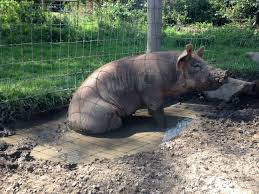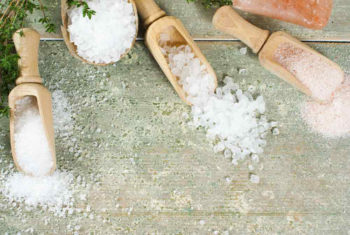Hello, Sovrn! Want to know how to keep your barn animals cool for the summer? If you want to be prepared for the upcoming hot summer months, let these tips be your guide.
Keeping Your Barn Animals Cool for the Summer | Homesteading Tips For Summer Preparedness
Just like with people, extreme heat during summer months can trigger heat stress that can be devastating to animals. Several animals are more sensitive to heat than others, however, all of them need some care because animals could also die from overheating just like people can. Check the tips below for some natural ways that you can keep your barn animals cool.
1. Provide lots of water to protect animals from heat

The first vital step in protecting your animals from heat is to provide them with lots of clean water. Just like people, animals sweat and need to replace the loss of water to prevent dehydration.
Keep in mind that some livestock, such as cows and horses, needs between 6 to 20 gallons of water per day! In summer, algae tend to grow in water buckets and troughs but this type won't hurt most animals, except to the few blue-green varieties that may be the result of water contaminated by fertilizer and can be toxic to your animals.
Stagnant water is a breeding ground for mosquitos and bacteria that is harmful to your animals. You want to keep your barn animals cool but not at the expense of their hygiene. Clean your water buckets and troughs at least every couple of days. Water can be precious in hard times and to preserve it wait until your buckets and troughs are empty before you clean it.
2. Ensure that shelters are well-ventilated to protect animals from heat

If you choose to let your animals out at night so that they can take advantage for the cooler air, that would perfect, however, if thieves is a problem in your area, that may not be a good idea. To ensure that there's plenty of ventilation in your barn keep the doors at either end of the barn open and keep the outside half-doors to the stalls open so that the air can get through.
3. Provide Access to Shade at All Times

Shade is a perfect way to keep your animals cool. If you have a lot of trees that can provide sufficient shade for all your animals, that's great. If not, then you need to build them a shelter that is positioned in such way that it's shaded all day.
4. Create a mud hole for your Pigs

Pigs can't sweat. So make sure they have plenty of shade and creating a mud hole for them would be a great way to keep them from overheating in the summertime, aside from providing them lots of water.
Find out why you grass fed beef REALLY is better than grain fed: http://t.co/rbOrg2H9Pu #homesteading #livestock pic.twitter.com/gNl9JTZ1wb
— Homesteading (@HomesteadingUSA) July 24, 2015
5. How to keep Chickens cool

Like dogs and cats, chickens pant to cool themselves. Provide them with lots of cold water. You can add ice to the water or place a bottle or gallon jug of frozen water in the water bucket. Another great way is to feed them with watermelon rinds or add frozen fruits and veggies to their water to keep it cool.
Just like any other livestock, chickens need electrolytes in addition to water to keep everything balanced. You can add Gatorade or Pedialyte to their water or make your own mix of 1/2 teaspoon salt substitute, 1 teaspoon baking soda 1 teaspoon table salt, 1 tablespoon sugar mix to a 1 gallon of water. Take note that there's is no need to give this mixture to a chicken that doesn't show signs of heat stress, though it does not hurt to provide it once a week or so.
6. Sheer sheep and other furry animals in the spring

Some wool actually helps keep a sheep and other wool producers cool. That is why many farmers sheer them in the spring so that by summer they have enough wool to keep cool and by winter, their coats are thick enough to keep them warm.
This also applies to dogs that have long or thick coats. Shave them in order to help them stay cool and keep them out of the sun and leave a bit of hair on them to protect their skin from sunburn.
7. Suppress them from hot surfaces

Asphalt, concrete, sand and even wood can get terribly hot and may burn your pet's body and paws. Suppress them from lying on hot surfaces because it can quickly raise their body temperature and put them at risk for heat stroke.
Once your dog shows signs of heat stroke such as thick sticky saliva, rapid panting, dizziness, weakness, vomiting, a bright red tongue, and extra red or pale gums, bathe them with room temperature water and allow him to dry naturally while keeping him out of the heat.
8. Electrolytes

Like people, in addition to water animals need salt and other minerals to stay hydrated and keep their bodies functioning.
You can buy salt blocks and mineral blocks from your local feed and hardware stores and put them in the pasture or in each individual feed bucket. Giving them free access to both is the best option because they can use it as their bodies crave for it. It is necessary to add salt block so that your animals can get salt that they need without the extra minerals.
Summer heat is dangerous to our pets and livestock as it is to us and many of the same common rules and principles apply. If you're in a situation where losing your animals may mean starving or being stranded, it's vital to protect your animals from heat.
Need more tips on how to keep your animals cool from the summer? Check out this video from A.T. Fence :
Do you think you can now keep your barn animals cool for the summer? Let us know below in the comments!

[…] Keeping Your Barn Animals Cool for the Summer | Homesteading Tips For Summer Preparedness […]